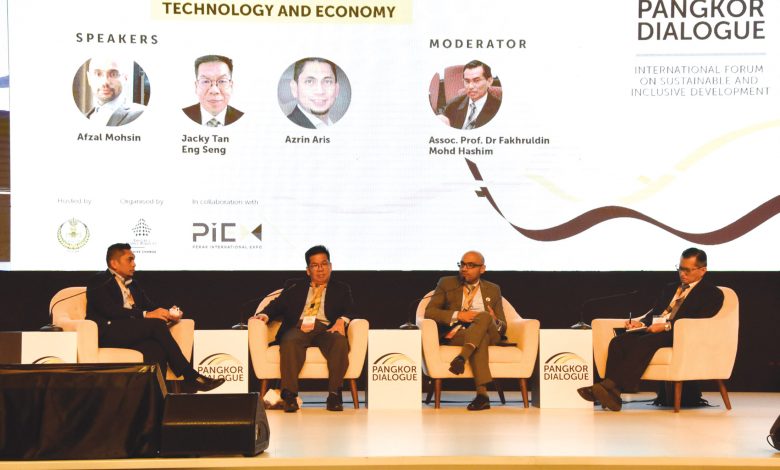

By A. Jeyaraj
I have attended all the Pangkor Dialogues (PD) except one. During the first PD, Dato’ Seri DiRaja Dr Zambry, then MB, explained that Perak is sandwiched between Selangor and Penang, the most industrialised states and investors by-pass Perak. We invite potential investors from around the world to attend PD so that they can see what Perak can offer and invest in the State.
Institut Darul Ridzuan (IDR) issued a pamphlet FAQ PANGKOR DIALOGUE 2019 and under What is Pangkor Dialogue?, it says “The PD is an international knowledge exchange which aims to inspire sustainable economic growth in the region in line with the Sustainable Development Goals. It is unique in the sense that it is one of the few dialogues in the world that is promoted by Perak State Government. PD is a platform where inside information is shared to find solutions for universal challenges faced by the region.” This sounds very noble. How are the shared ideas going to be translated into action plans and implemented? Who does it?
This year’s PD was one of the events at the Perak International Expo 2019 held at Stadium Indera Mulia in November 2019. The theme was Sustainable and Inclusive Development.
The session started with a Keynote address by Tan Sri Rafidah Aziz, former Minister of International Trade and Industries. It was a pity that only about a hundred people were present in a hall meant to seat a thousand people; fewer people were in attendance during other keynote presentations and dialogue sessions.
The main keynote address was by Jeffrey David Sachs, an American economist who is known as one of the world’s leading experts on economic development. He gave a gloomy picture of the future. He added all is not lost and requested governments to focus on six key issues for transformation.
Perak government can implement what’s within its means. The issues are educating values, promoting health and well-being, moving to a green energy system, sustainable land use, sustainable cities, shared vehicles and public transport and smart digital economy. The government should organise public forums and get feedback from the people on how these can be implemented.
During the Dialogue session on Technology & Economy, one of the speakers Jacky Tan Eng Seng, founder of Polydamic Group said his company provides environmental services including Air Pollution Control Systems. For the past 10 years, he has been working in China and over the years the country has developed greatly. The salary of the workers has gone up many folds. Nowadays he takes local workers to China because he cannot afford to pay workers there. In contrast, the starting salary of graduates in this country has been stagnant for the past 10 years.
Jacky showed a slide of countries that are getting ready for 5G technology. Malaysia is not one of them and Jacky highlighted this.
The following day during Dialogue Session on IR4.0, one of the speakers, Professor Dr Nurhizam Safie Mohd Satar of UKM said that Malaysia higher education blueprint 2013-2025 aims to produce students equipped with current skills. The country is ready for IR4.
There is a contradictory opinion between an industrialist and academician on our preparedness to accept new technology. Is our country on the right track to meet the demands of 5G and IR4? Are we training workers with appropriate skills?
Though I am not interested in sports, I attended the second half of the dialogue session on Youth & Sports. One of the speakers, Dean Ratcliffe, Head Coach, MedwayTri, informed how Perak can become the centre of e-sports in the country. He feels Ipoh is an ideal place to develop sports. He gave suggestions which can be implemented immediately to develop e-sports. State Exco for Sports should look into this.
A video clip was shown during the dialogue session on Sustainable Tourism. The narrative was in Malay, Chinese and an Indian dialect which I couldn’t identify. In Malaysia, most Indians speak and understand Tamil. It looked like the video was about medical tourism. I don’t know who the target audience is.
The programme was not given to the audience and they did not know the details of the presentations. A banner of the programme could have been placed at the entrance of the hall. More people would have attended if they knew the programme.
The public still does not know how much was spent on previous PDs and how Perak benefitted. It is interesting to listen to professional speakers, but what is the end result? The previous government has not given any feedback.
This year, the PH government which championed for transparency, organised Perak International Expo 2019 which included Pangkor Dialogue. The event was held in November 2019 and I suggest that in about three months after that, Dato’ Seri Ir Mohammad Nizar Bin Jamaluddin, Executive Councillor for Investment, Industrial and Corridor Development who was Chairman, PIEX Main Committee announce the cost for this event and the outcome. He can have a press meet. “Perak expects to attract RM3 billion in investments” was the heading of a news item in NST November 12, 2019. Can Ir Nizar confirm this?
The public has become more civic-minded and would really like to know how their money is spent.


